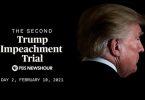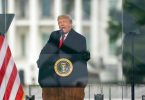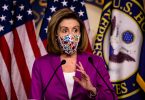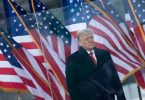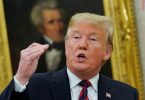President Donald Trump announces tariffs on steel, aluminum-ABC News
President Donald Trump announced steep tariffs on imports of steel and aluminum to address what he says is an “assault on our country.”
Trump says a 25 percent tax will apply to steel imports, and 10 percent will be added to aluminum brought into the U.S.
Trump says the excess of imported steel and aluminum is a “travesty” and hurts American workers and industry.
In making the long-awaited announcement Thursday, Trump says the U.S. industry has been “ravaged by aggressive foreign trade practices.”
Says Trump, “It’s really an assault on our country.”
Trump invited the workers present at the announcement to speak. Several spoke of how excessive “dumping” of steel and aluminum imports had negatively affected their jobs and families.
Trump included temporary exemptions for Canada and Mexico as he seeks to revise the North American Free Trade Agreement. He suggested Australia and “other countries” might also be spared, a shift that could soften the international blow amid threats of retaliation by trading partners.
Trump’s tariffs will take effect in 15 days, according to people outside the White House who were briefed on the plans Thursday. Those people spoke on condition of anonymity ahead of the president’s signing of the orders.
“We’re going to be very fair, we’re going to be very flexible but we’re going to protect the American worker as I said I would do in my campaign,” Trump said during a Cabinet meeting.
The president reiterated that he would levy tariffs of 25 percent on imported steel and 10 percent on aluminum but would “have a right to go up or down depending on the country and I’ll have a right to drop out countries or add countries. I just want fairness.”
Reacting to the announcement, Illinois Sen. Dick Durbin said in statement: “President Trump wants to put China on notice for their abusive trade practices that hurt American workers and industries. I support that. The sweeping tariffs announced today are like dropping a bomb on a flea. Launching an all-out trade war will alienate the allies we need to actually solve the problem of steel dumping, and could have huge unintended consequences for American manufacturers who depend on imported materials.”
Representative Peter Roskam (R-IL) also released a statement, saying, “While we must stop countries like China from dumping steel in our market, the actions taken today by the Administration could hurt companies, employees and consumers in my district. The establishment of an exclusion process for American companies and manufacturers that are required to import steel due to a lack of domestic supply is a positive step in mitigation. I hope to see this rolled out in a manner that won’t disrupt our manufacturing.”
One Republican senator promised to introduce legislation to nullify the new tariffs.
Sen. Jeff Flake of Arizona said, “Congress cannot be complicit as the administration courts economic disaster.”
He’s urging his colleagues to pass the bill before the administration inflicts “more damage on the economy.”
Trump’s exemptions on steel and aluminum products from Mexico and Canada did not satisfy lawmakers.
They would rather see the tariffs imposed just on certain countries that are dumping exports. Rep. Mark Walker of North Carolina, the chairman of the conservative Republican Study Committee, said it’s better to target “these rogue players.”
Another GOP bill would require Congress to approve trade actions, but it’s doubtful the GOP-led Congress can muster the votes to block Trump.
The process of announcing the penalties has been the subject of an intense debate and chaotic exchanges within the White House, pitting hard-liners against free trade advocates such as outgoing economic adviser Gary Cohn aiming to add more flexibility for U.S. trading partners.
The fight over tariffs comes amid intense turmoil in the West Wing, which has seen waves of departures and negative news stories that have left Trump increasingly isolated in the Oval Office, according to two senior officials speaking on the condition of anonymity to discuss internal thinking. Trump was still hearing last-minute pleas from opponents of the tariff plan, and White House officials said they couldn’t predict how the day would shake out.
Steel and aluminum workers were invited to the White House for the afternoon announcement with Trump.
Peter Navarro, Trump’s trade and manufacturing adviser, said in an interview on Fox Business on Wednesday that the tariffs would go into effect within about 15 to 30 days and that the proclamation signed by the president would include a clause that would not immediately impose tariffs on Canada and Mexico.
Press secretary Sarah Huckabee Sanders told reporters the exemptions would be made on a “case by case” and “country by country” basis, a reversal from the policy articulated by the White House just days ago that there would be no exemptions from Trump’s plan.
Congressional Republicans and business groups are bracing for the impact of the tariffs, appearing resigned to additional protectionist trade actions as Trump signals upcoming economic battles with China.
The looming departure of Cohn, a former Goldman Sachs executive who has opposed the promised tariffs, set off anxiety among business leaders and investors worried about a potential trade war.
“We urge you to reconsider the idea of broad tariffs to avoid unintended negative consequences to the U.S. economy and its workers,” 107 House Republicans wrote in a letter to Trump.
At the White House, officials were working to include language in the tariffs that would give Trump the flexibility to approve exemptions for certain countries.
“He’s already indicated a degree of flexibility, I think a very sensible, very balanced degree of flexibility,” Commerce Secretary Wilbur Ross told CNBC. “We’re not trying to blow up the world.”
Trump signaled other trade actions could be in the works. In a tweet, he said the “U.S. is acting swiftly on Intellectual Property theft.” A White House official said Trump was referencing an ongoing investigation of China in which the U.S. trade representative is studying whether Chinese intellectual property rules are “unreasonable or discriminatory” to American business.
The official, who was not authorized to discuss internal deliberations and spoke on the condition of anonymity, said an announcement on the findings of the report – and possible retaliatory actions – was expected within the next three weeks.
Business leaders, meanwhile, continued to sound the alarm about the potential economic fallout from tariffs, with the president and CEO of the U.S. Chamber of Commerce raising the specter of a global trade war. That scenario, Tom Donohue said, would endanger the economic momentum from the GOP tax cuts and Trump’s rollback of regulations.
“We urge the administration to take this risk seriously,” Donohue said.
The president has said the tariffs are needed to reinforce lagging American steel and aluminum industries and protect national security. He has tried to use the tariffs as leverage in ongoing talks to renegotiate NAFTA, suggesting Canada and Mexico might be exempted from tariffs if they offer more favorable terms under the trade agreement.


